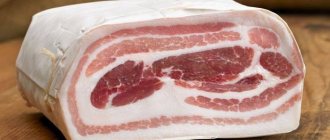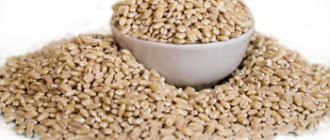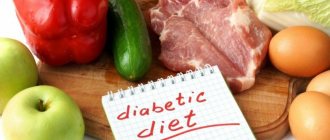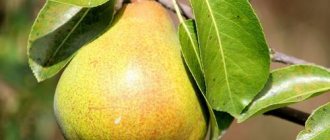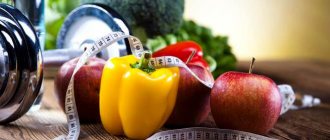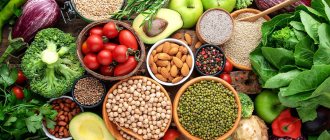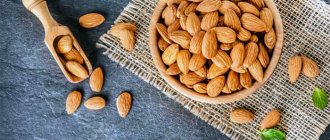General rules
Fasting days are prescribed for medical reasons for obesity , diabetes , atherosclerosis and other cardiovascular diseases.
Carrying out fasting days for 1-2 days and no more than once a week is not dangerous to health and is recommended by doctors. Even one fasting day carried out incorrectly cannot significantly harm your health. On fasting days (or contrast days), a gentle regime is created for the internal organs and the removal of metabolic products is improved. As a result of unloading, metabolism improves, since the “shake-up” received by the body these days helps accelerate the burning of fat deposits. Since the calorie content these days does not exceed 600-1000 kcal, unloading is effective for weight loss.
However, restricting your diet for 1-2 days does not lead to sustainable weight loss. Returning to a normal diet ends in weight gain. Therefore, short-term fasting without changes in daily nutrition and without physical activity is useless for weight loss. Short-term fasting prepares the body for the transition to healthy foods.
Various unloading options are best carried out against the background of various balanced dietary programs in order to reduce the calorie content of the daily diet and boost metabolism. According to the predominance of nutrients, unloading can be divided into protein (meat, fish, curd, kefir), carbohydrate (fruit, rice-fruit, vegetable), with the use of liquid (herbal tea, juices, rosehip decoction, green tea, mineral water). At the same time, it is not recommended to consume more than 2 kg of vegetables or fruits and 700 g of protein food during the day. Protein days allow you to maintain weight at the same level, and carbohydrate days will promote weight loss, but it will occur due to the loss of excess fluid.
The general rules are:
- consumption of low-calorie foods;
- eating up to 6 times in equal portions;
- exclusion of bread, sweets and salt;
- individual selection of products for fasting according to taste preferences, in order to prevent severe hunger and avoid overeating in the future;
- exclusion of heavy physical and mental stress;
- drinking enough liquid - the best choice would be still mineral water, regular filtered water, a decoction of rose hips and sea buckthorn (if the acidity of gastric juice is not increased);
- the next day after fasting, eat moderately; you should not pounce on food, catching up on lost time.
Fasting diets differ from fasting days in duration - usually three days or more. When undertaking longer fasting periods, think about the fact that an unbalanced diet when consuming one product, a lack of proteins, fats and carbohydrates can affect your health over time. Long-term and frequent use can lead to vitamin deficiency, anemia (especially in women given monthly blood loss), diseases of the digestive system and lead to muscle tissue degeneration. Therefore, if you practice unloading regularly, it is better to change the composition of the products.
This is the basis of the fasting diet for 3 days, which consists of 3 mono-diets, including only carbohydrates on some days, and only proteins on others. Each product is evenly distributed into 5-6 doses. Salt, spices and sauces should not be added to prepared dishes; tea should be drunk without sugar.
There are many options for a three-day diet, from which you can choose the most suitable one for you:
- The first day is buckwheat porridge, cooked from a glass of sorted buckwheat, without salt and butter. You can supplement your diet with green salad or spinach. Drink 1.5-2 liters of water during the day.
- Second day - boiled chicken breast (700-800 g) without salt, water with lemon juice and green tea without sugar.
- Third day - 1.5 liters of kefir.
According to the second option, on the first day, boiled chicken meat is included in the same quantity, on the second day - a salad without salt from fresh vegetables (cabbage, celery, carrots - 0.5 kg each), seasoned with lemon juice, on the third day - 4- 5 pieces of grapefruit and 10 cups of green tea without sugar. It is recommended to drink 2 liters of still water on all days.
According to the third nutrition option, on the first day you can eat boiled veal (chicken), cooked without salt. The second day is devoted to vegetables and fruits, 1.5-2 kg per day in total. Third day - 1.5 liters of kefir.
These diets, designed for 3 days, allow you to reduce weight by 2-3 kg. It is not recommended to create additional stress on the kidneys while on them by taking diuretics or diuretic herbs. Diets are easy to tolerate, but they cannot be carried out every week.
A 7-day fasting diet is more varied in composition, but also involves eating one specific product during the day. Let's look at the menu for 7 days.
Fermented milk day
Any fermented milk products that are not very fatty are consumed: kefir, acidophilus, low-fat fermented baked milk, yogurt or cottage cheese. Choose your favorite product and consume it all day, dividing it into 6 doses. You can drink 1.5 liters of fermented milk drinks, and 500-600 g of cottage cheese.
Vegetable day
Raw, non-starchy vegetables are consumed: tomatoes, cabbage, peppers, Chinese cabbage, greens, lettuce, cucumbers. Of course, potatoes are excluded, and carrots and beets are only raw and limited. Make salads without salt and oil with the addition of lemon juice or natural vinegar.
Fruit day
Any berries and fruits in the amount of 1.5 kg. Grapes, persimmons, figs, melon and bananas are excluded.
Buckwheat day
Porridge from a glass of buckwheat, cooked without salt or oil.
Protein day
Boiled meat, chicken breast, eggs or milk are allowed. Meat in the amount of 700g, milk - 1.5 liters.
Fish day
Boiled, steamed or baked fish. It is allowed to eat any fish, including fatty types: mackerel, trout, salmon, pink salmon.
Liquid day
Drink unsweetened fruit and vegetable juices, herbal tea without sugar, and you can drink whey.
This is a classic version of a fasting diet for a week, since it takes into account the basic principle of fasting - eating one product during the day. Another nutrition option is also offered, but it is more related to a balanced diet, since different foods are consumed throughout the day. Here is an example of one day when you can eat vinaigrette, bread, cottage cheese, low-fat milk, fish, vegetarian borscht and salads.
Separately, it is necessary to say about fasting days to cleanse the body, the purpose of which is not so much weight loss as the removal of toxins and metabolic products from the body. On these days, proteins, fats and simple carbohydrates are excluded. As you know, fiber from vegetables helps cleanse the body, so the diet includes vegetables (mainly cabbage, cucumbers, tomatoes, zucchini) and greens, vegetable juices and mineral water. It is necessary to eat minimal portions without oversaturating the body.
Vegetables can be eaten raw and boiled (stewed without salt and fat) in the form of vegetable soups made from cabbage, legumes or pumpkin. Every morning you need to start with a glass of fresh juice from cucumbers, green salads and spinach. Divide meals into small portions every three hours. Drinking water and plenty of plant fiber reduces hunger.
The “cleansing” effect is enhanced by 1 tbsp. l. vegetable oil, taken on an empty stomach, and choleretic tea, taken during the day.
The first version of a simple diet for seven days
Each day of a simple seven-day diet provides a separate mono-diet; the days must be followed in a clear sequence. Adding salt and sweetening food is strictly prohibited, as is drinking alcohol. Violation of these points can affect the final result. Please note that it is impossible to change the order of days, but within one day it is quite possible to adjust the consumed dishes that satisfy the corresponding mono-diet. The main thing is not to overeat and not to mix foods from different groups.
- First day: start of the diet
On this day, the basis of the diet consists of liquid dishes: broth, dairy, fermented milk products. Breakfast: a glass of kefir, unsweetened tea. Lunch: a glass of chicken broth (necessarily without salt). Afternoon snack: a glass of natural yoghurt. Dinner: a glass of low-fat milk.
- Second day: vegetable
The second day involves eating raw vegetables and herbs; the salad is allowed to be seasoned with vegetable oil (preferably olive oil). Breakfast: two tomatoes. Lunch: salad of cucumbers, cabbage, herbs with vegetable oil. Afternoon snack: two cucumbers. Dinner: salad of cucumber, bell pepper, herbs.
- Third day: water
The third day is similar to the first, it involves the consumption of liquid foods: broths, dairy and fermented milk products. Breakfast: a glass of milkshake, unsweetened tea. Second breakfast: a glass of low-fat milk. Lunch: a glass of chicken broth (necessarily without salt). Afternoon snack: a glass of low-fat kefir. Dinner: a glass of low-fat milk.
In addition to the usual dairy products, you can treat yourself to a milkshake
- Day four: fruity
The menu for this day consists of fresh fruits rich in vitamins and minerals. Breakfast: two medium oranges. Second breakfast: medium-sized grapefruit. Lunch: fruit salad of apple, orange, kiwi. Afternoon snack: pear, apple. Dinner: medium-sized grapefruit.
To prevent grapefruit from becoming bitter, remove the white membranes from it.
- Fifth day: protein
This day will delight you with hearty dishes. You can eat eggs, fish, meat, cheese, cottage cheese and even peas. After strict restrictions, you will finally be able to get your fill. Breakfast: two boiled eggs. Second breakfast: boiled fish (about 200 g). Lunch: boiled chicken (about 150 g), boiled peas (100 g). Afternoon snack: low-fat cottage cheese (about 100 g). Dinner: low-fat cheese (about 100 g).
- Sixth day: water
This day also includes liquid foods: broth, dairy products, tea and juice. Breakfast: a glass of low-fat kefir, unsweetened tea. Second breakfast: a glass of grapefruit juice. Lunch: a glass of chicken broth (necessarily without salt). Afternoon snack: a glass of milkshake. Dinner: a glass of low-fat milk.
Chicken broth contains many vitamins
- Seventh day: final
This day prepares the body to exit the diet. It involves eating different foods, so the nutrition is balanced. Breakfast: two boiled eggs, unsweetened green tea. Second breakfast: any fruit as desired. Lunch: soup with rice (buckwheat) added. Afternoon snack: any fruit as desired. Dinner: vegetable salad dressed with vegetable oil.
Authorized Products
A fasting diet for 3 days includes a limited list of products:
- Buckwheat for cooking porridge in water without salt and oil.
- Boiled chicken breast or chicken meat without skin in the amount of 700-800 g (optimal, allowed by nutritionists). It is possible to increase the amount of meat when you feel hungry.
- Kefir 1% in the amount of 1.5 liters.
If you choose a 7-day diet, additionally included:
- Non-starchy vegetables: tomatoes, cabbage, peppers, Chinese cabbage, greens, lettuce, cucumbers. Any fish prepared by boiling or baking without salt or spices.
- Beef instead of chicken, rabbit or turkey, cooked by boiling or baking without salt or fat.
- Low-fat cottage cheese instead of kefir.
- Eggs instead of meat.
- Unsweetened berries and fruits with a calorie content of up to 45 kcal in a total amount of 1.5 kg per day: apricots, pineapples, pomelo, oranges, grapefruit, lemons, watermelon, cherries, pears, tangerines, nectarines, peaches, feijoa, plums, cherries, cherries , apples, mulberries, currants, gooseberries, raspberries, blackberries, blueberries, strawberries, strawberries, princessberries, blueberries.
- Purified water up to 2 liters, herbal teas, green tea with lemon, rosehip infusion, freshly squeezed juices of vegetables and unsweetened fruits.
Table of permitted products
| Proteins, g | Fats, g | Carbohydrates, g | Calories, kcal | |
Vegetables and greens | ||||
| greenery | 2,6 | 0,4 | 5,2 | 36 |
| zucchini | 0,6 | 0,3 | 4,6 | 24 |
| cabbage | 1,8 | 0,1 | 4,7 | 27 |
| broccoli | 3,0 | 0,4 | 5,2 | 28 |
| Brussels sprouts | 4,8 | 0,0 | 8,0 | 43 |
| carrot | 1,3 | 0,1 | 6,9 | 32 |
| cucumbers | 0,8 | 0,1 | 2,8 | 15 |
| salad pepper | 1,3 | 0,0 | 5,3 | 27 |
| salad | 1,2 | 0,3 | 1,3 | 12 |
| beet | 1,5 | 0,1 | 8,8 | 40 |
| celery | 0,9 | 0,1 | 2,1 | 12 |
| asparagus | 1,9 | 0,1 | 3,1 | 20 |
| tomatoes | 0,6 | 0,2 | 4,2 | 20 |
Fruits | ||||
| oranges | 0,9 | 0,2 | 8,1 | 36 |
| pomegranate | 0,9 | 0,0 | 13,9 | 52 |
| grapefruit | 0,7 | 0,2 | 6,5 | 29 |
| pears | 0,4 | 0,3 | 10,9 | 42 |
| kiwi | 1,0 | 0,6 | 10,3 | 48 |
| lemons | 0,9 | 0,1 | 3,0 | 16 |
| tangerines | 0,8 | 0,2 | 7,5 | 33 |
| nectarine | 0,9 | 0,2 | 11,8 | 48 |
| peaches | 0,9 | 0,1 | 11,3 | 46 |
| apples | 0,4 | 0,4 | 9,8 | 47 |
Berries | ||||
| gooseberry | 0,7 | 0,2 | 12,0 | 43 |
| Red currants | 0,6 | 0,2 | 7,7 | 43 |
| black currant | 1,0 | 0,4 | 7,3 | 44 |
Cereals and porridges | ||||
| buckwheat (kernel) | 12,6 | 3,3 | 62,1 | 313 |
Dairy | ||||
| skim milk | 2,0 | 0,1 | 4,8 | 31 |
| natural yogurt 2% | 4,3 | 2,0 | 6,2 | 60 |
Cheeses and cottage cheese | ||||
| cottage cheese 0.6% (low fat) | 18,0 | 0,6 | 1,8 | 88 |
Meat products | ||||
| beef | 18,9 | 19,4 | 0,0 | 187 |
| rabbit | 21,0 | 8,0 | 0,0 | 156 |
Bird | ||||
| chicken fillet | 23,1 | 1,2 | 0,0 | 110 |
Fish and seafood | ||||
| fish | 18,5 | 4,9 | 0,0 | 136 |
Non-alcoholic drinks | ||||
| mineral water | 0,0 | 0,0 | 0,0 | — |
| green tea | 0,0 | 0,0 | 0,0 | — |
| * data is per 100 g of product | ||||
Contraindications for fasting days to cleanse the body
Anyone can do a fasting day to cleanse the body at home, provided there are no contraindications. Cleansing the body during inflammation of the stomach is allowed only in the early stages. For this purpose, special diets are used, oatmeal without sugar or salt. The process of preparing the flakes lasts no more than 20 minutes. This diet is carried out about once every 7 days.
Treatment with low-calorie foods is beneficial for the whole body; digestive processes are normalized. During the period of exacerbation of the ulcer, fasting is prohibited. A preliminary consultation with a doctor will help you avoid additional disorders and problems. The gastrointestinal tract should be unloaded systematically.
The nutritional mechanism of cleansing the body is contraindicated in a number of disorders and pathologies. Pregnancy is the basis for the ban. Main options:
- ulcerative colic, which bothers you even at night;
- inflammation of the intestine;
- hernia in the esophagus, laryngeal edema;
- development of enteritis and classic colitis;
- dysbiosis. The patient has stool disturbances, allergic disorders, cramping pain;
- the presence of different forms of hemorrhoids + cuts in the stomach;
- diagnosing IBS (intestinal disease);
- inflammatory processes in the pancreas and liver (pancreatitis);
- increased acidity.
This is interesting
Fully or partially limited products
- Fatty meats, fried meats.
- Any fats (animal and vegetable).
- Smoked meats, sausages.
- High fat dairy products.
- Pastries, cookies, any bread, puff pastry and pastry products, cakes, pastries.
- Any cereals except buckwheat.
- Chocolate, ice cream.
- Salt, sugar.
Table of prohibited products
| Proteins, g | Fats, g | Carbohydrates, g | Calories, kcal | |
Vegetables and greens | ||||
| radish | 1,2 | 0,1 | 3,4 | 19 |
| white radish | 1,4 | 0,0 | 4,1 | 21 |
| red radish | 1,2 | 0,1 | 3,4 | 20 |
| black radish | 1,9 | 0,2 | 6,7 | 35 |
| spinach | 2,9 | 0,3 | 2,0 | 22 |
| sorrel | 1,5 | 0,3 | 2,9 | 19 |
Fruits | ||||
| bananas | 1,5 | 0,2 | 21,8 | 95 |
Berries | ||||
| grape | 0,6 | 0,2 | 16,8 | 65 |
Mushrooms | ||||
| mushrooms | 3,5 | 2,0 | 2,5 | 30 |
Nuts and dried fruits | ||||
| raisin | 2,9 | 0,6 | 66,0 | 264 |
Cereals and porridges | ||||
| semolina | 10,3 | 1,0 | 73,3 | 328 |
| white rice | 6,7 | 0,7 | 78,9 | 344 |
Flour and pasta | ||||
| pasta | 10,4 | 1,1 | 69,7 | 337 |
Confectionery | ||||
| jam | 0,3 | 0,2 | 63,0 | 263 |
| jam | 0,3 | 0,1 | 56,0 | 238 |
| candies | 4,3 | 19,8 | 67,5 | 453 |
| pastry cream | 0,2 | 26,0 | 16,5 | 300 |
| cookie | 7,5 | 11,8 | 74,9 | 417 |
Ice cream | ||||
| ice cream | 3,7 | 6,9 | 22,1 | 189 |
Cakes | ||||
| cake | 4,4 | 23,4 | 45,2 | 407 |
Chocolate | ||||
| chocolate | 5,4 | 35,3 | 56,5 | 544 |
Raw materials and seasonings | ||||
| mustard | 5,7 | 6,4 | 22,0 | 162 |
| mayonnaise | 2,4 | 67,0 | 3,9 | 627 |
Dairy | ||||
| milk 3.6% | 2,8 | 3,6 | 4,7 | 62 |
| milk 4.5% | 3,1 | 4,5 | 4,7 | 72 |
| cream | 2,8 | 20,0 | 3,7 | 205 |
| sour cream 25% (classic) | 2,6 | 25,0 | 2,5 | 248 |
Cheeses and cottage cheese | ||||
| cheese | 24,1 | 29,5 | 0,3 | 363 |
| cottage cheese 11% | 16,0 | 11,0 | 1,0 | 170 |
| cottage cheese 18% (fat) | 14,0 | 18,0 | 2,8 | 232 |
Meat products | ||||
| pork | 16,0 | 21,6 | 0,0 | 259 |
| pork liver | 18,8 | 3,6 | 0,0 | 108 |
| pork kidneys | 13,0 | 3,1 | 0,0 | 80 |
| pork fat | 1,4 | 92,8 | 0,0 | 841 |
| salo | 2,4 | 89,0 | 0,0 | 797 |
| beef liver | 17,4 | 3,1 | 0,0 | 98 |
| beef kidneys | 12,5 | 1,8 | 0,0 | 66 |
| beef brains | 9,5 | 9,5 | 0,0 | 124 |
Sausages | ||||
| smoked sausage | 16,2 | 44,6 | 0,0 | 466 |
| smoked sausage | 9,9 | 63,2 | 0,3 | 608 |
| sausages | 10,1 | 31,6 | 1,9 | 332 |
| sausages | 12,3 | 25,3 | 0,0 | 277 |
Bird | ||||
| smoked chicken | 27,5 | 8,2 | 0,0 | 184 |
| duck | 16,5 | 61,2 | 0,0 | 346 |
| smoked duck | 19,0 | 28,4 | 0,0 | 337 |
| goose | 16,1 | 33,3 | 0,0 | 364 |
Fish and seafood | ||||
| smoked fish | 26,8 | 9,9 | 0,0 | 196 |
| salted fish | 19,2 | 2,0 | 0,0 | 190 |
| Red caviar | 32,0 | 15,0 | 0,0 | 263 |
| black caviar | 28,0 | 9,7 | 0,0 | 203 |
| canned fish | 17,5 | 2,0 | 0,0 | 88 |
| cod (liver in oil) | 4,2 | 65,7 | 1,2 | 613 |
Oils and fats | ||||
| animal fat | 0,0 | 99,7 | 0,0 | 897 |
| cooking fat | 0,0 | 99,7 | 0,0 | 897 |
Non-alcoholic drinks | ||||
| instant coffee dry | 15,0 | 3,5 | 0,0 | 94 |
| black tea | 20,0 | 5,1 | 6,9 | 152 |
| * data is per 100 g of product | ||||
Advantages and disadvantages
| pros | Minuses |
|
|
How unloading works
The main goal of a one-day or longer fasting diet is to cleanse the body of waste, toxins and excess fluid. At this time, you will not have to sit only on water (although such diet options do exist), you will just need to significantly reduce the calorie content of your food (compared to your usual diet).
The following products help you lose weight and cleanse your body:
- fermented milk (fat content - 1.5%, no more);
- vegetables;
- fruits;
- buckwheat porridge;
- Hercules;
- lean varieties of meat and fish.
Diets based on groups of nutrients are also widely used; for example, protein or carbohydrate days can be arranged in order to rearrange metabolic processes. The essence of eating foods from one group is that they do not put a large burden on the gastrointestinal tract and allow the body to digest everything that has accumulated in it during normal food consumption.
Such techniques are suitable not only for weight loss, but also for improving the condition of the skin, since they cleanse the intestines of toxins and waste, which most often cause acne and pimples.
Psychologically, surviving for several days on a low-calorie menu will be quite simple; it is much more convenient than various long-term diets. However, it is worth remembering that even if you follow the diet for 1 day, you need to properly prepare for it and exit it correctly. To do this, you should not overeat on the evening before the fasting day; it is best to get by with a glass of kefir or a light vegetable salad. On the first day after unloading, you also do not need to immediately pounce on high-calorie foods; it is best to gradually introduce familiar dishes into your diet over several days.
Reviews and results
Three-day fasting diets, due to their short duration and composition, are easier to tolerate and help to slightly reduce weight. They can be used when you need to quickly lose a few kilograms. Longer unloadings are more effective, but can have a negative impact on health due to their imbalance. Therefore, before you start eating according to such a system, you should consult a nutritionist.
- “... I’m used to the fact that my weight either decreases or increases if I start eating everything. I often try different fasting and diets. I noticed that after a three-day fast it is easier to switch to proper nutrition, as the stomach contracts and something changes in the body. The last time I lost 3 kg in 3 days, and then switched to a balanced diet, which included cereals, meat, eggs, fish, vegetables and fruits. I only eat protein with vegetables, and porridge separately from everything else. I excluded sweets. I can eat healthy bread as a snack. Of course, such nutrition does not cause hunger and you feel comfortable, but the weight decreases very slowly. I decided to do 1-3 day fasting against the backdrop of such a diet - it would be correct and more effective.”
- “... I do three-day fastings every two months. This is not harmful to health and not at all difficult. I tried the seven-day plan only once, but failed on the fifth day. I can say that after I started practicing fasting, I don’t feel like eating unhealthy food (I call it food garbage). I already forgot when I ate hamburgers, chips, salted nuts and crackers, sweet cookies and candies. I replaced all this with dried fruits, raw nuts and seeds, flax seeds, and cookies made from whole grain flour with bran, which I bake myself. I eat honey instead of sugar; they didn’t make jam. I began to eat fish and meat only boiled or baked and switched to vegetable soups. If you eat this way, and even “cleanse” and unload the body, everything will be fine – both weight and health.”
Why fasting diets don't work
Despite the fact that nutritionists have proven the effectiveness of fasting days, you may not notice the desired result. This happens for the following reasons:
- improper nutrition in the intervals between fasting;
- irregular cleaning;
- the presence of chronic or acute diseases.
Remember that to cleanse the body and lose weight, one day spent on a meager diet will only be useful if you have already chosen the right balanced diet for yourself and have excluded harmful trans fats (cakes and pastries), fast food, semi-finished products from your menu, soda and other harmful products. It is important not to skip your fasting days - do them once a week, preferably on a weekend.
